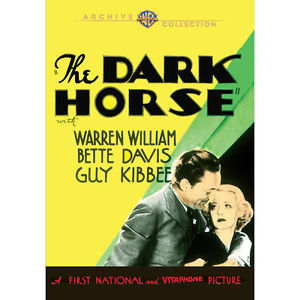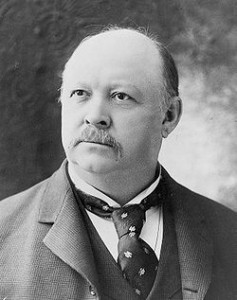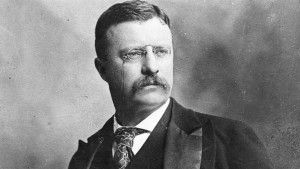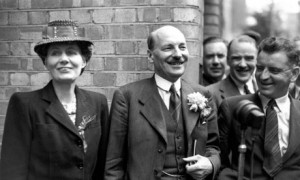Read any book about World War II and you’re bound to find inspiring quotes by Winston Churchill, along with some withering comments he made about rival politicians. One of his favorite targets was Clement Attlee who inspired these classic lines:
–A sheep in sheep’s clothing.
–A modest man, who has much to be modest about.
–An empty taxi arrived at 10 Downing Street, and when the door was opened, Attlee got out.
My multilingual mother–given to quotations in Latin, German and French–especially loved the middle one above. She also credited Churchill with the line “Every time he opens his mouth he subtracts from the sum total of human knowledge.”
When I looked for the source, the brilliant line didn’t show up anywhere on Churchill web sites. But there’s a cinematic connection: The Dark Horse, a forgotten 1932 political satire starring Bette Davis.
 It features a nitwit politician whose adviser has instructed him to answer tough questions with “Well yes, but then again no.” The politician is classed as “so dumb that every time he opens his mouth he subtracts from the sum total of human knowledge.”
It features a nitwit politician whose adviser has instructed him to answer tough questions with “Well yes, but then again no.” The politician is classed as “so dumb that every time he opens his mouth he subtracts from the sum total of human knowledge.”
The line’s political lineage extends further back to the powerful Republican Speaker of the House Thomas B. Reed, who was nicknamed “Czar Reed.”
 In 1909, Pearson Magazine no. 22 reported Reed explaining why he ignored one Representative while paying attention to another:
In 1909, Pearson Magazine no. 22 reported Reed explaining why he ignored one Representative while paying attention to another:
“Whenever A takes the floor, the House learns something, but when that fellow B speaks, he invariably subtracts from the sum total of human knowledge.”
We have to assume the line had filtered into political discourse enough so that the script writers of Dark Horse could use it to comic effect not too many years later. Did Reed come up with it on his own? At first it seems likely, since his recent biographer says he was renowned for his wit.
Teddy Roosevelt, though, would seem to get ultimate credit for the phrase. Biographers Peter Collier and David Horowitz wrote that TR used it to dismiss an opponent on New York’s Civil Service Commission when he was the Commissioner from 1889-1895. He put down his rival with these words: “Every time he opens his mouth, he subtracts from the sum total of human wisdom.”
 Lev Raphael’s comic mystery series, set in the hothouse world of academia, has been praised by The New York Times Book Review and many other newspapers. You can find them on Amazon. Lev teaches online writing creative workshops at writewithoutborders.com.
Lev Raphael’s comic mystery series, set in the hothouse world of academia, has been praised by The New York Times Book Review and many other newspapers. You can find them on Amazon. Lev teaches online writing creative workshops at writewithoutborders.com.

